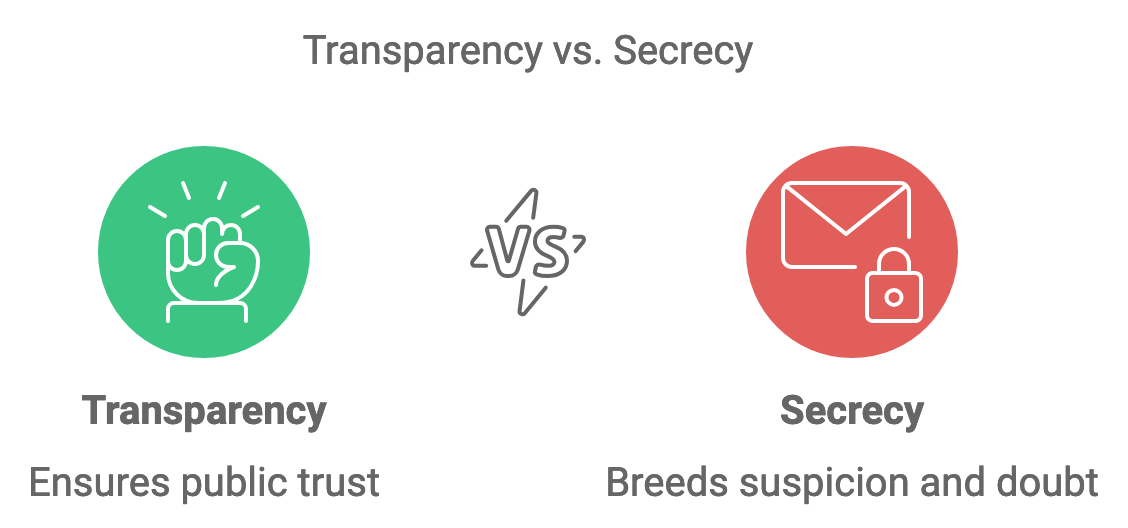Argument in Favor of Councillors Having Access to the CEO’s Resignation Letter: A Public Interest Perspective
From the perspective of the general public, particularly the ratepayer, access to the CEO’s resignation letter by councillors is critical to ensuring transparency, accountability, and trust in how local government functions. Ratepayers contribute directly to the funding of the council, including the salaries of senior executives like the CEO. Therefore, when a publicly funded CEO resigns, the public has a vested interest in understanding the circumstances surrounding the resignation and how it impacts the operations of their local government.
1. Public Money and Accountability
The CEO’s salary, benefits, and potentially severance payments are drawn from public funds, funded by ratepayers. In any organization funded by the public, it is essential that financial transactions, especially those involving high-level executives, be transparent. Ratepayers have a right to know why their money is being used to pay for the resignation of a CEO and whether there are any underlying issues that might indicate governance problems or misuse of resources.
Councillors Rose, Thaler, and Williamson argued well for access to this information, highlighting the need for transparency and proper oversight. Unfortunately, their efforts were denied by partisan councillors, including Mayor Hanna, Councillors Hopkins, Summers, Higgins, Rooney, and Davis. The refusal to allow access to such critical information raises serious concerns about the integrity of the council's governance. It is deeply troubling to witness councillors hiding behind procedural walls rather than engaging openly with the community they serve, especially when the resignation of a CEO funded by public money is involved.
2. Trust in Leadership and Good Governance
The CEO plays a crucial role in managing the day-to-day operations of the council, and their resignation could have a significant impact on the services that ratepayers rely on, such as infrastructure, public utilities, and community programs. Ratepayers expect their elected representatives to ensure that any leadership transition is handled smoothly and that the reasons for the CEO’s departure have not compromised, and do not compromise the quality of these services.
When councillors have access to the resignation letter, they can assess whether the resignation was for personal reasons, governance concerns, or performance issues that may affect council operations. Denying access, as done by Mayor Hanna and other partisan councillors, undermines the very trust ratepayers place in their elected officials to ensure transparent governance. Such behavior creates a veil of secrecy, leaving the public questioning the true motivations behind the resignation and whether there are larger issues being concealed.
3. Public Interest and Transparency
The resignation of a publicly funded CEO is not a private matter; it is inherently in the public interest. Ratepayers rely on the proper functioning of their local council, and when there is a change in leadership, the public deserves to know the reasons behind that change to ensure it is not symptomatic of larger governance issues.
Councillors, as elected representatives, are responsible for safeguarding public interest. The refusal to engage with the larger community by certain councillors is a gross failure of their duties. Withholding this information from councillors, who represent the community’s interests, contradicts the principle of transparency and raises suspicions of governance failures. The public has a right to hold their government accountable, and this starts with ensuring that major decisions, such as the resignation of a CEO, are made with full disclosure to those in charge of oversight. The statutory obligation of councillors is to oversee good governance, due process and procedural correctness according to the legislation. To not do so leaves them in breach of the requirements of their role.
4. Empowering Councillors to Serve the Public
Councillors are elected by the public to act as their representatives and stewards of public resources. Their ability to fulfill this role is hindered if they do not have access to critical information, such as the CEO’s resignation letter. If councillors are making decisions about appointing a new CEO or managing the transition without knowing why the previous CEO resigned, it puts the quality of their decisions—and by extension, the interests of the public—at risk.
The actions of Mayor Hanna and his partisan allies—Councillors Hopkins, Summers, Higgins, Rooney, and Davis—demonstrate a failure to engage responsibly with the public’s need for transparency. Their refusal to grant access to the resignation letter leaves councillors who advocate for public interest, like Rose, Thaler, and Williamson, powerless to perform their duties effectively. Ratepayers expect their representatives to make decisions based on full information, and any obstruction to this weakens the foundation of local government accountability.
5. Preventing Corruption and Ensuring Good Governance
One of the primary functions of transparency in government is to prevent corruption. If a CEO resigns, it is best practice for the Board to receive the resignation letter. In unusual circumstances such as legal challenges, governance conflicts, financial mismanagement, or workplace misconduct, withholding the resignation letter from the Board (councillors) and, by extension, the public, prevents proper investigation or accountability and contravenes statutory governance responsibilities.
The refusal by certain councillors to provide access to the resignation letter not only denies the public their right to transparency but also raises concerns about whether governance issues, possibly including improper use of public funds or other misconduct, are being covered up. It is a worrying precedent when elected officials deny access to such important information, which could be critical for preventing or exposing corruption within the council.
6. Public Right to Know
The general public has a right to know about decisions that affect them, particularly when those decisions involve the use of public money. The resignation of a CEO can have a significant impact on the direction of the council and, subsequently, the services provided to ratepayers. Withholding information about why a CEO has left their position deprives the public of their right to understand the circumstances of major decisions affecting their community.
Ratepayers, who are essentially the shareholders in the council, should be able to trust that their elected representatives have full access to critical information. When partisan politics take precedence over transparency and accountability, as demonstrated by Mayor Hanna and his allies, the public’s trust in their government is eroded. Councillors like Rose, Thaler, and Williamson are right to push for access to the resignation letter, as they act in the interests of the community and the ratepayers who expect and right to expect that councillors can fulfill their statutory obligations.
In conclusion, from the perspective of the general public and ratepayers, councillors should have full access to the CEO’s resignation letter to ensure accountability, transparency, and trust in their local government. Since public funds are involved and the resignation may directly impact council function and services, the public deserves assurance that their representatives are making decisions based on complete and accurate information.
The refusal by Mayor Hanna and his partisan councillors at the first council meeting to allow access to such information is a disturbing trend that undermines the public’s right to transparency. Without this access, there is a risk of undermining good governance, public trust, and the efficient management of public resources.










Great article - clear and to the point - what a mess this council is with just 3 councillors focussed on and fighting for transparency and honesty, how can anything progress for the benefit of the community. Thank god they're there for us. How can withholding this information ever look like anything other than deceit and a coverup on behalf of the Mayor and his followers.
What other information will these old councillors deside to deny to the new councillors?